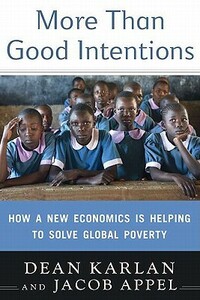Take a photo of a barcode or cover
5 reviews for:
More Than Good Intentions: How a New Economics Is Helping to Solve Global Poverty
Dean Karlan, Jacob Appel
5 reviews for:
More Than Good Intentions: How a New Economics Is Helping to Solve Global Poverty
Dean Karlan, Jacob Appel
Case studies of the application of behavioral economics to poverty alleviation programs, most of which boil down to a menu of small scale banking and getting people to use mosquito nets, put chlorine in water at dispensing stations and give their kids anti-diarrhea salts correctly. The trick, however, is marketing it appropriately to local conditions (will "rebate" or "matching funds" go over better?), controlling the program agents on the ground for corruption and neglect and avoiding large scale solutions that are ill suited to various circumstances.
Good ideas, written in an accessible manner. Just not terribly inspiring.
Definitely worth the read for anyone who wants to maximize the benefit of their donations or to anyone trying to understand how economic development works.
It's great to contribute money to an organization helping sick women in Guatemala...but how do you know your money is effective? Dean Karlan is president and founder of Innovations for Poverty Action, an organization I have great admiration for because not only do they seek projects for the greater good, but they test them to make sure they actually work. The book reviews various projects in an extremely readable manner and encourages everyone to be critical of methods used to save the world.
This is a great book for people just starting out thinking about how to make their donations matter. From a social science perspective, a lot of the experiments are quite clever – I also learned a lot about the social context in which many of these problems are able to exist.


